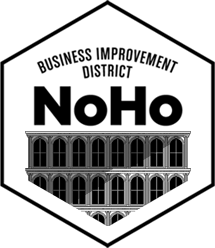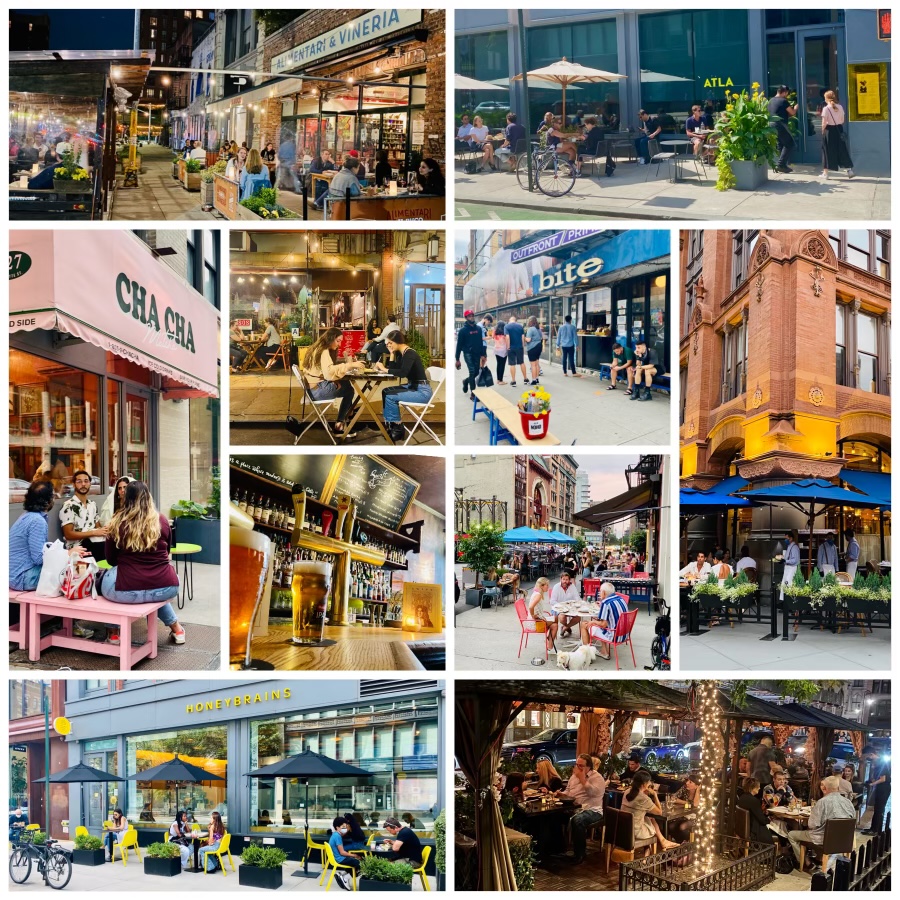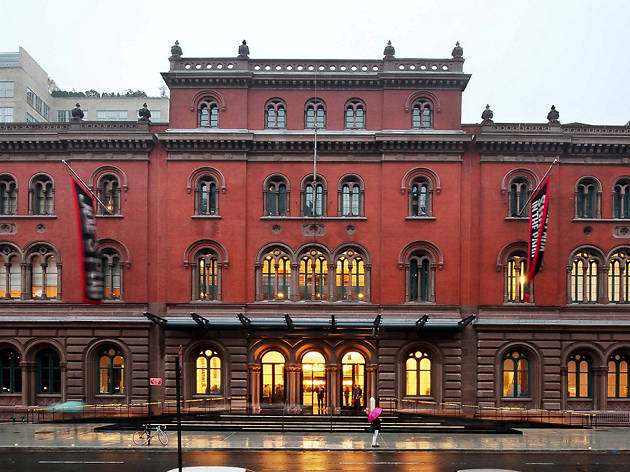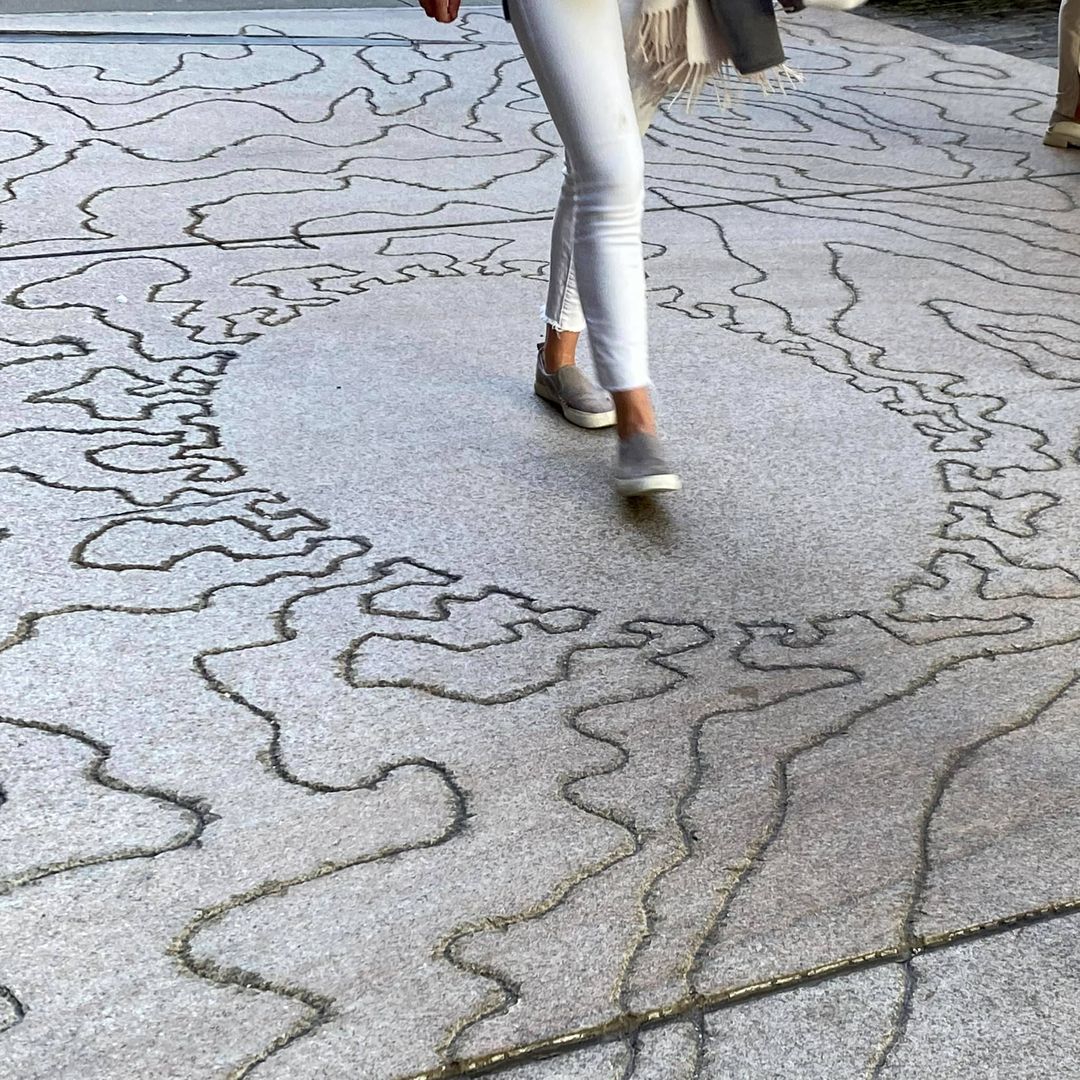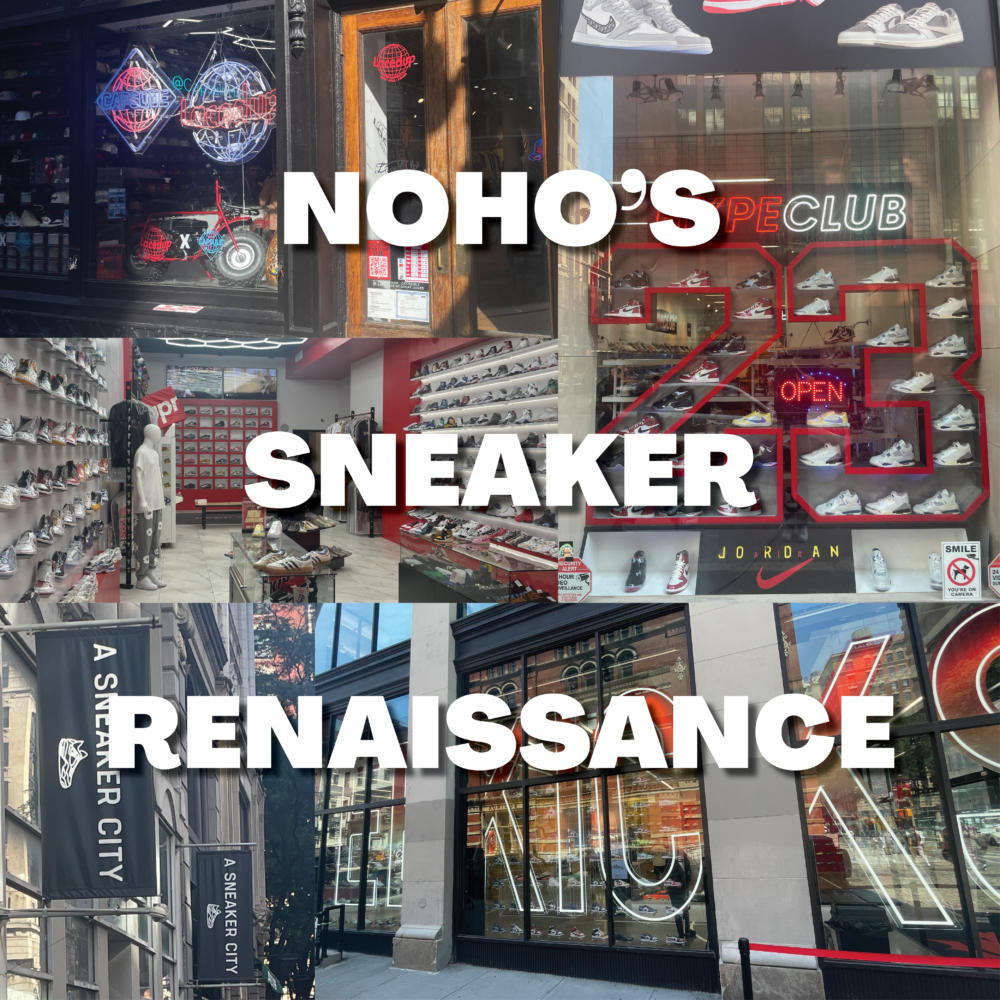
By Raoul Herskovits
NoHo has many claims to fame (high-end fashion, diverse architecture, vibrant arts scene to name a few) but if you’re really “in the know,” you’ve probably noticed a different scene that’s exploded over the last few years: sneakers. In addition to larger nationwide chains like Foot Locker and Adidas, NoHo has seen an explosion of sneaker stores dealing in the factory-new, the worn, the accessible, and the one-of-a-kind, turning NoHo into one of NYC’s most attractive sneaker hotspots.
But this recent development is actually a return to form for NoHo, rather than a leap into new territory. Sneakerhead culture has a rich history rooted in the basketball, skateboarding, hip hop, and graffiti scenes of the ‘80s and ‘90s. As you may know, NoHo became a Hip Hop hub during this time, where famous MC’s would make deals, record, and perform among the neighborhood’s flourishing clubs. NoHo was in a street art golden age as well, with graffiti legends like Basquiat and Al Diaz making their mark in the neighborhood. Basically, NoHo was the exact primordial soup from which the life of sneaker culture would emerge, leading to the opening of NoHo classics like KITH. After Supreme’s original store opened on Lafayette, sneakers were catapulted into the mainstream and the rest was history.

30 years later, the culture has changed a lot, and sneakers have gone far beyond a niche subculture. For the layman, the sheer variety of these stores can be hard to grasp; a sneaker store is a sneaker store, right? Join me, an uninitiated but aspirational sneaker newbie, on a tour of NoHo’s newest sneaker joints to find out how that isn’t quite the case, and how each of these boutiques bring something unique to the table.
The Neighborhood Breakdown
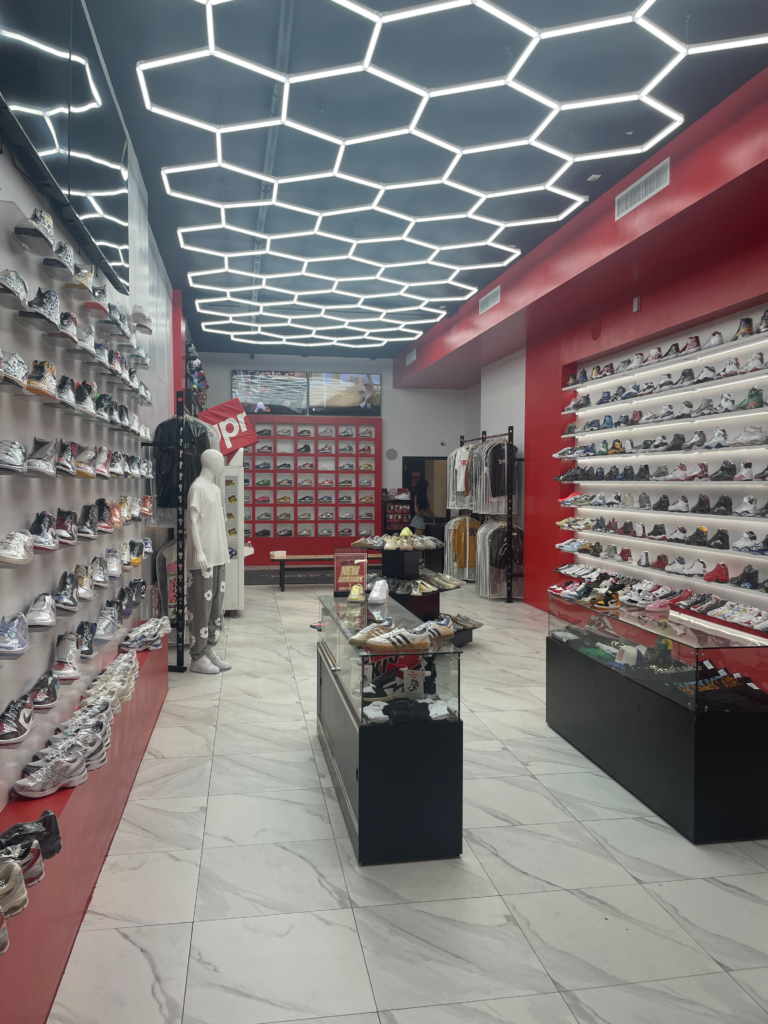
Kickclusive — “The Temple” — 682 Broadway
The first thing you learn about sneaker stores is that they are only as good as their salespeople; Isaiah “Zay” the owner of NoHo’s Kickclusive, is a walking masterclass of salesmanship. A sneakerhead since day one, Isaiah would come down to NoHo as a kid looking for good deals. Now he has a store of his own, which radiates his pure dedication to the game. This is a place for “the everyday sneakerhead,” as he puts it, with low markups from online prices to make the shopping experience as accessible as possible. You can sense the love for sneaker culture flowing throughout the space; I felt like I was in a temple to the sneaker gods.
If it isn’t apparent from the perfect customer reviews, Kickclusive’s highest priority is turning a one-time customer into a return customer. A kind and patient staff makes sure you’re cared for, and when it’s too hot, Isaiah will set up small tables outside the store to reach new customers. A place like this reminds you that sneaker stores are real marketplaces; Kickclusive buys and trades sneakers as much as it sells them. Isaiah keeps things fair, but also won’t turn down a great deal when he’s given one: “some people just don’t realize what they got on their feet!” When I asked him what shoe he thought was underrated, he showed me the Jordan 8 Retro ‘Doernbechers’. The name comes from Doernbechers’ children’s hospital, and proceeds go to curing a rare disease. A very classy choice, and man, those are some fun looking shoes.
“We’re for the Everyday Sneakerhead”


Yankeekicks — “The Museum” — 666 Broadway
NoHo’s stores range a ton in size. At the top end, you have something like Yankeekicks, which takes up a massive corner of Broadway and Bond. The place can only be compared to a museum, with different exhibits for different genres of shoes, wrapped to perfection or stored in statuesque hanging containers. And oh yeah, there are actual statues too, as well as designer figurines. “The aesthetic” is what sets Yankeekicks apart according to store manager Caroline; the “clean and sleek” design makes people know they are getting a top-quality product. Their more close-quarters backroom is dedicated to what is called ‘consignment’: Come here to put your own shoes up for sale (provided they pass inspection) and receive a payout after they sell, with Yankeekicks taking a small commission.
“Rappers, Actors, Comedians, you’d be surprised how many”
You might know Yankeekicks from their high-profile opening party, featuring the Migos’ Offset and Mayor Eric Adams. This is the Yankeekicks brand to a tea: high-profile goods for high-profile customers. When I asked Caroline what their main customer base was, she didn’t hesitate at all: “Celebrities: rappers, actors, comedians, you’d be surprised how many.” When I asked if she wanted to share any names, she declined, which means they probably are really famous. As for her underrated shoe of choice, she kept it simple, recommending the classic Nike Air Max: “people don’t appreciate comfort anymore.” Walking around that store, the true lap of luxury, I certainly got comfort’s appeal.
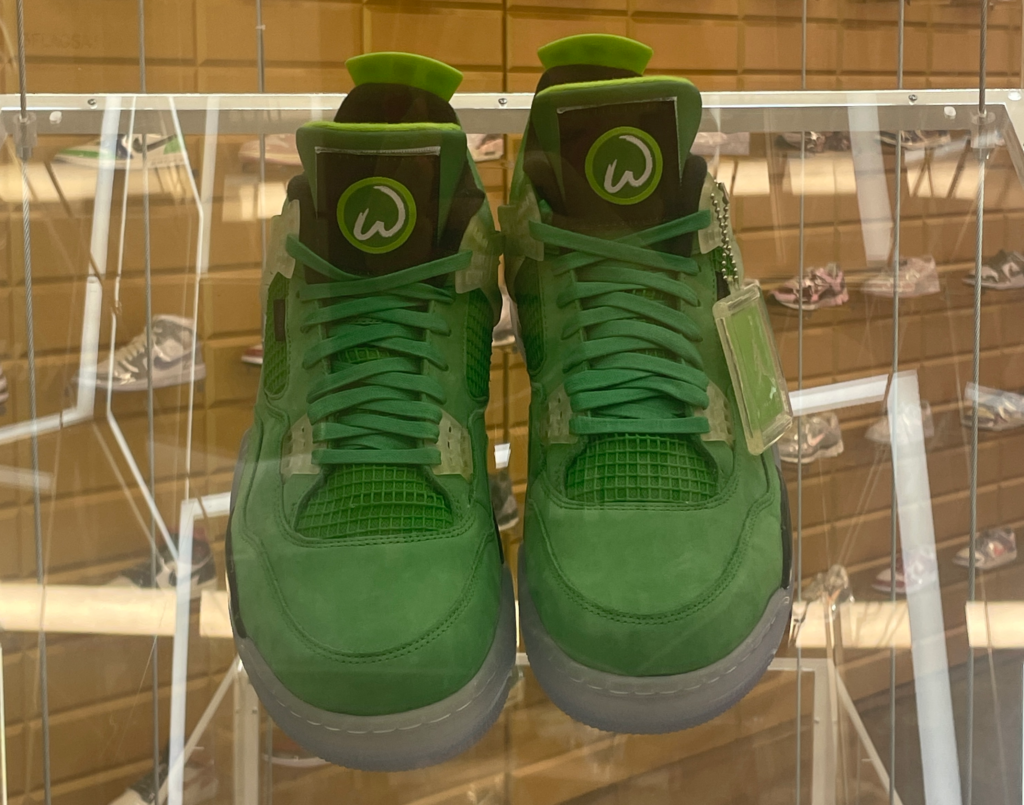
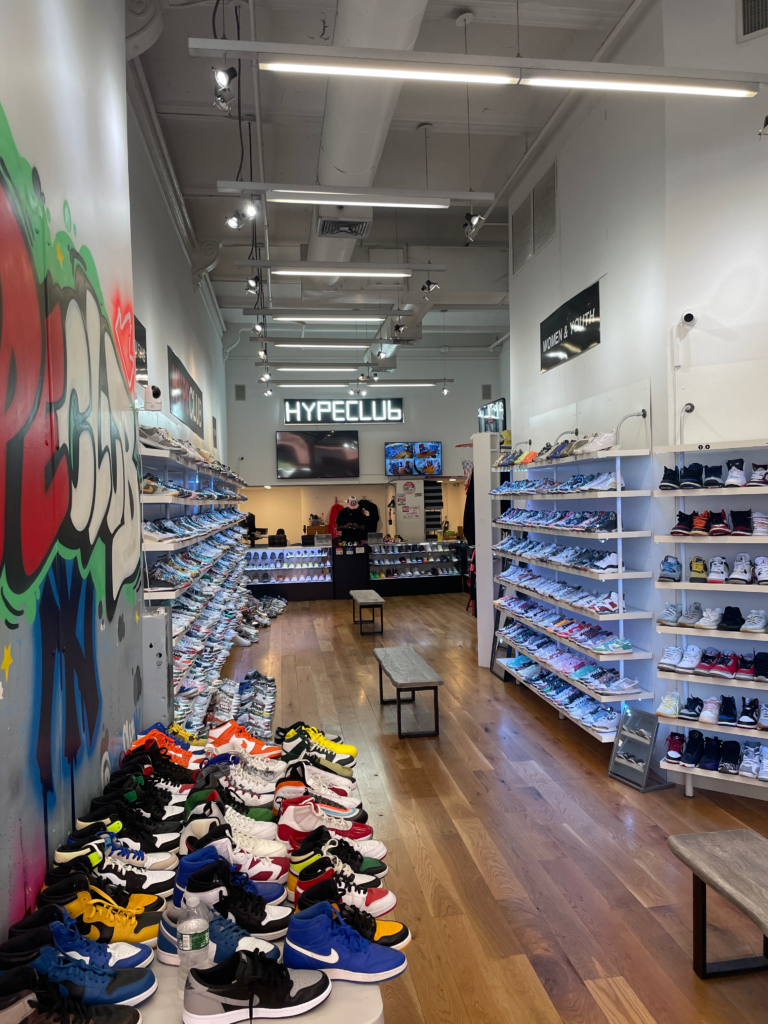
HypeClub — “The Laboratory” — 710 Broadway
On the other end of the size spectrum, you have HypeClub, which has the vibe of a mad scientist’s workshop; filled to the brim with both vacuum-sealed kicks and used pairs, this cozy joint feels like a sneakerhead’s basement in all the right ways. Justin, a Hypeclub salesman, attributes most of their clientele to simple foot traffic. “It’s like a reality show,” with different characters from tourists to celebrities walking through the front door all day: “unpredictable, fun, and entertaining.” It makes sense: that much variety and interaction, and some crazy things are bound to happen. Justin recounts an instance where he convinced an oblivious shoe thief to return the stolen goods, and got a loyal customer out of the deal! Now that’s a good salesman.
Justin and Moe, the two salesmen I talked to, work hard to create the store’s homey environment and prioritize customer relationships. What jumped out to me the most, though, was how razor sharp they were when it came to understanding the market. Hearing Justin talk about recent price fluctuations made me feel like I was in The Big Short, the depth of knowledge blowing me away at every turn. When I asked what pair he thought were underrated, he brought my attention to the Travis Scott “Canary” Retro Jordan 1s. They’ll currently run you around $300, but he predicts they’ll be worth $900 in the future. Hey, I believe him.
“It’s Like a Reality Show”


Laced Up — “The Bazaar” — 684 Broadway
The sneaker world is a close cousin to the wider streetwear scene. Most stores include some degree of apparel, but none bring it all together quite like Laced Up. This store has, put simply, everything: designer brands, graphic tees, sweaters, jeans, a whole vintage store in the back, an in-house original brand of hats, and of course, a huge selection of shoes. “A one stop shop” is how Panama, the incredibly charming manager, describes it. If you’re looking to buy an entire outfit without crossing the street, go to Laced Up, and get a Supreme jet ski while you’re there to really make the fit stand out. The maximalist aesthetic gives the feel of a bustling marketplace, where it’s just as fun to wander around in as it is to make a purchase.
Such a diverse place will attract all kinds of people, from “kids to celebrities on a weekly basis.” Panama remembers showing Tommy Hilfiger around the store without even recognizing the fashion titan. They talked for almost an hour before he realized he was talking with a literal brand name. Laced Up strives to be different and set a new precedent for what a sneaker store can be. “It’s a different atmosphere. We’re pioneering this thing.” Right on theme, Panama’s underrated kicks of choice were the CPFM Flea 1s, an absolutely off-the-wall pair with trimable fur and attachable Nike symbols. Different, unpredictable, fresh, just like the store itself.
“A One Stop Shop”

A Sneaker City — “The Hub” — 659 Broadway
If you’re looking for that mix of apparel and footwear but in a more classic environment, A Sneaker City has you covered. Stephanie and Caroline, the two saleswomen I spoke to, keep it simple, but also like to have fun. “Unreal, unique, authentic,” are the three words they chose to describe A Sneaker City, and that authenticity might be the most integral part of the brand. The store is Buy-Sell-Trade, and the pair talk about how they try to find discount offers for returning customers, which is a big part of their customer base. Check out their instagram for frequent giveaways as well!
The store’s interior is everything you want in a sneaker store: plenty of display space for browsing, comfy couches for trying stuff on, the works. Head on upstairs for a loft full of apparel and accessory options, featuring just about every signature brand you might want. If you’re looking for a reliable spot with something for everyone, this is the place for you. When asked about their underrated shoe of choice, Stephanie and Caroline chose an old favorite, Jordan 1s. They say people have drifted away from Jordans, but recommend you stick to the classics.
“Unreal, Unique, Authentic”
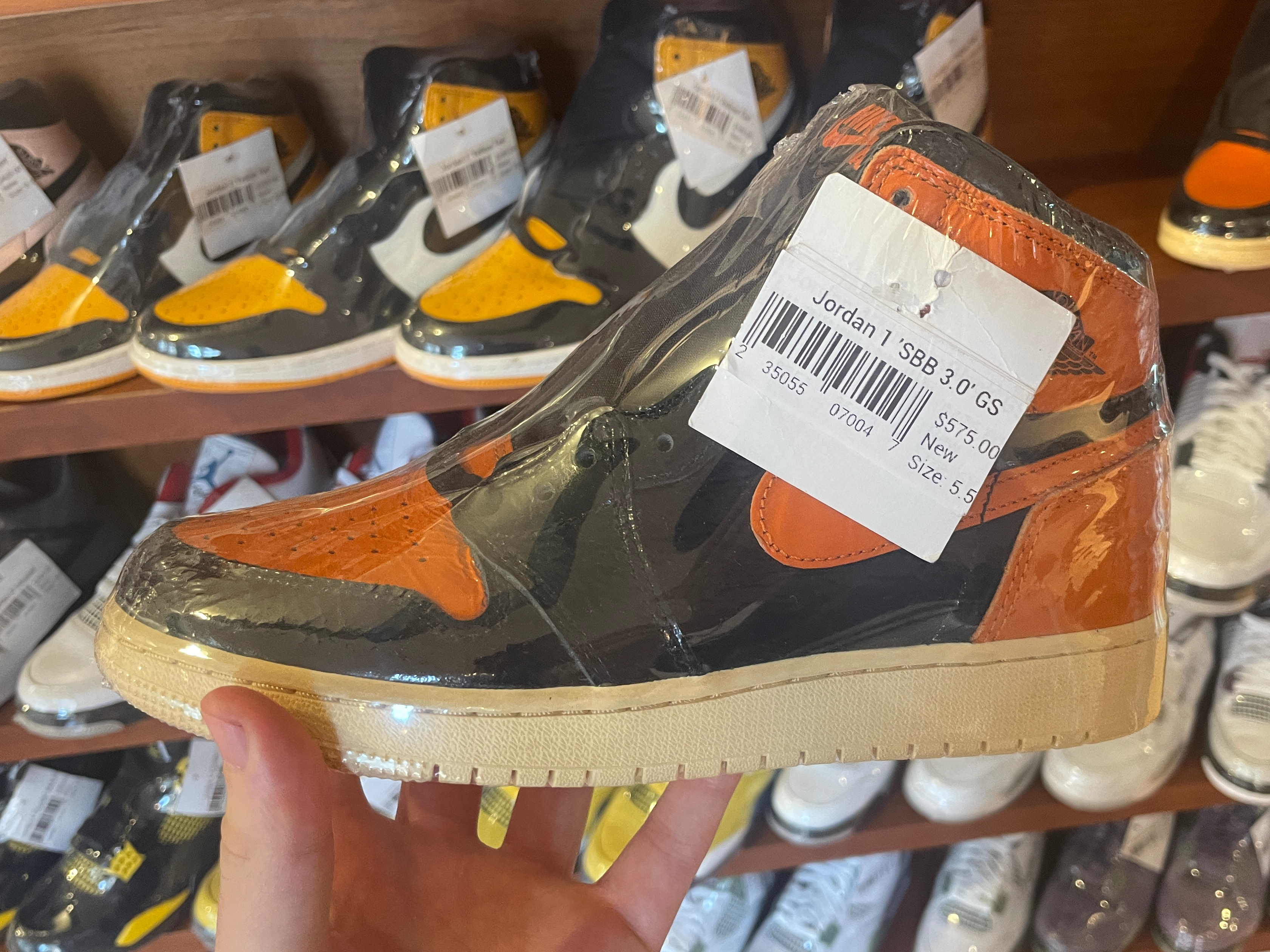
Prices, Prices, Prices

The question I hear most often about the sneaker world is “why are they all so damn expensive?” The short answer is: they’re not all that expensive. Sure, there are hyper-rare pairs like the Jordan 4 ‘Wahlburgers’ (a pair designed exclusively for Mark Wahlburg and Michael Jordan) that are absurdly expensive (~$50k for the Wahlburgers), but most Nike classics (Air Force 1s, Jordan 1 Mids and Lows, Dunks) are in such abundance that they stay around $100 despite their wide reputation; you can even customize colors and materials on most brand websites to feel unique while not breaking the bank. If you want something a little more special, you can find some slightly limited variants for around $200.
But finding a reliable pair of shoes to wear isn’t really the point. The appearance of the shoes is absolutely a factor, but the exclusivity, the reputation, and the story behind a pair are more important when it comes to market value. And that’s the key word here: Market. Most one-time releases have a starting retail price of $200-$300. Only after these shoes instantly sell out does the secondary market take charge and prices spike, plummet, and zigzag all over the place. These pairs are called “deadstock,” meaning they are no longer sold by their original retailer. The secondary market, which is where deadstock are bought and sold, is worth an estimated $1.2 billion and is more comparable to the art market or stock market than it is to retail fashion.
Sneaker stores like these deal almost exclusively in deadstock. Owners and salesmen like Isaiah need to keep track of market prices and price their shoes accordingly, but also keep in mind the price at which their store bought the shoe. Isaiah describes situations where a flurry of undercuts leads to a sudden drop in a shoe’s price. “That’s when I buy. 9 out of 10 times it goes up.” Sometimes, though, it doesn’t. Isaiah bought a pair of Jordan 4’s that have since gone down, but small businesses like his can’t afford to sell for an outright loss, so they’re forced to upcharge, wait for the value to rise, or hope that an eager hypebeast disregards the price tag.
The truth is, the secondary sneaker market has taken a big hit this year. “The cost of living is going up, and people are having to be more smart with how they spend their money.” The financial squeeze on a lot of would-be sneaker buyers has caused things like the fall of Jordan 1 prices. Well, financial burden and over-saturation in the market: “they just made way too many colors.” Turns out you can’t just keep doing limited releases of rearranged palettes forever, which is why things like celebrity collaborations are more reliable investments. The sneaker market is complex and dynamic, just like any other big secondary market, and it can seem silly to the outsider until you realize just how much money a hobbyist stands to make provided some smarts, timing, and luck. Isaiah, the owner of Kickclusive, raised the capital to start his business in no small part thanks to sneaker trading. Back in 2013, he got his hands on a ton of brand new “Oreo” Jordan 5 pairs, which go on to become iconic, make him a handy sum, and inspire him to start Kickclusive.
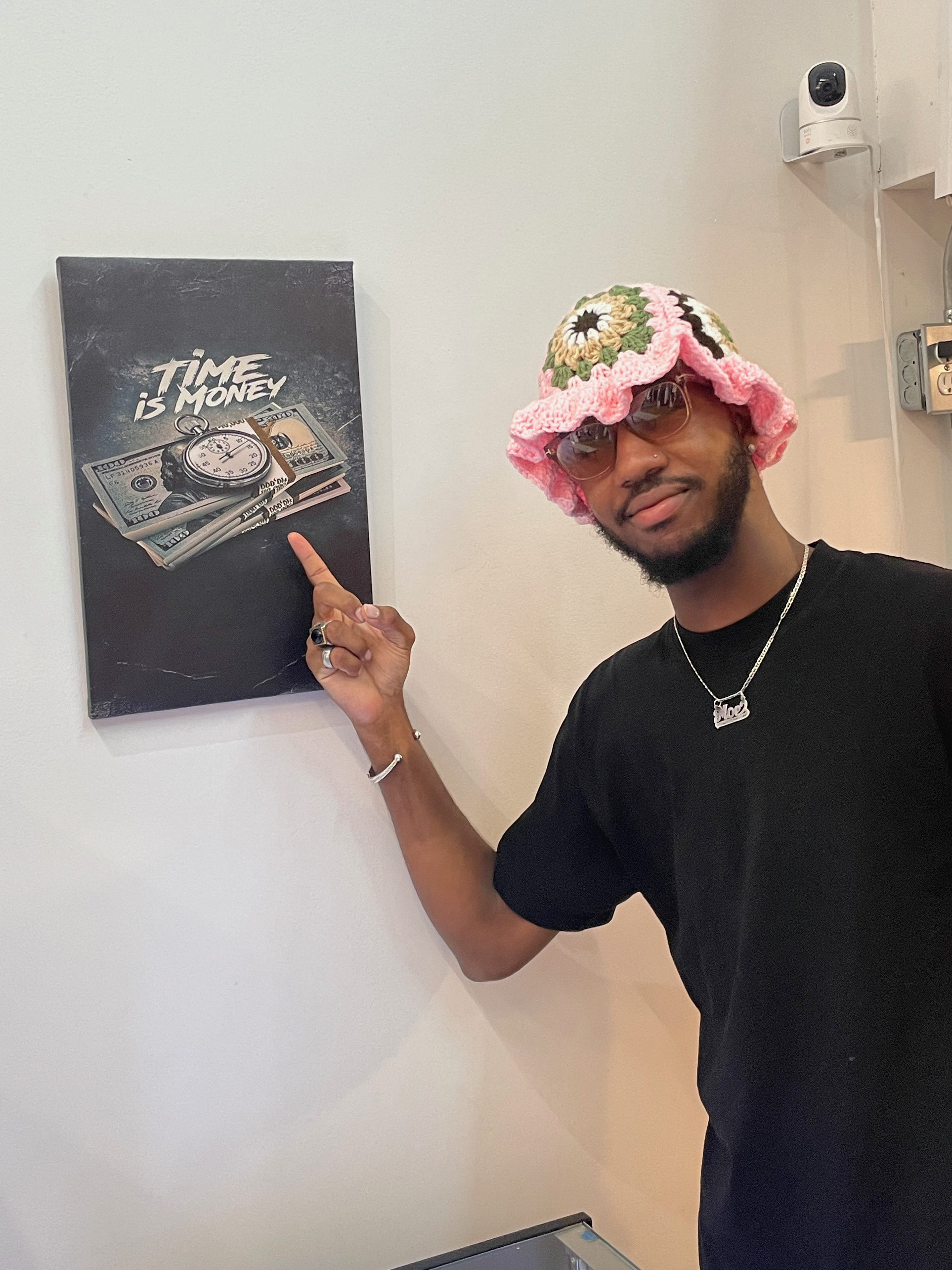
Sneakers on the Street
It’s a competitive industry without a doubt, but seeing so many in-person sneaker stores pop up, even as online shopping continues to grow, is nothing short of inspiring. During the pandemic, it felt like retail had taken a blow from which it may never recover, and the rise of fast fashion and ever-increasing shipping efficiency didn’t bode well either. On paper, virtual shopping has the clear upper hand: prices are lower, and you don’t even have to leave your couch. But we don’t live on paper, nor do we live online, and despite the numbers disadvantage, retail has made a strong comeback.
Turns out, online sneaker shopping is less reliable than you’d think, chock full of misleading images, hidden fees, and no refunds. This sentiment was shared by most workers I spoke with, all of whom saw retail sneaker shopping as not going anywhere. “You never know what you’re going to get online,” says Zay. As Panama put it “there’s no security when you buy online, It’s kinda like one and done.” Caroline from Yankeekicks also stressed online fees and how sneaky they can be.
Retail does so many other things that you can’t get online. For one, the spontaneity of a tourist purchase is exclusive to in-person shopping, tourists being an important customer in this area. Most of all, people like the experience of shopping in person, and being guided by such deeply knowledgable salespeople. Witnessing their charm and intelligence firsthand, I completely understood the appeal. Online shopping isn’t going anywhere, but the security, reliability, and just plain fun of the firsthand shopping experience is well worth the small premium.
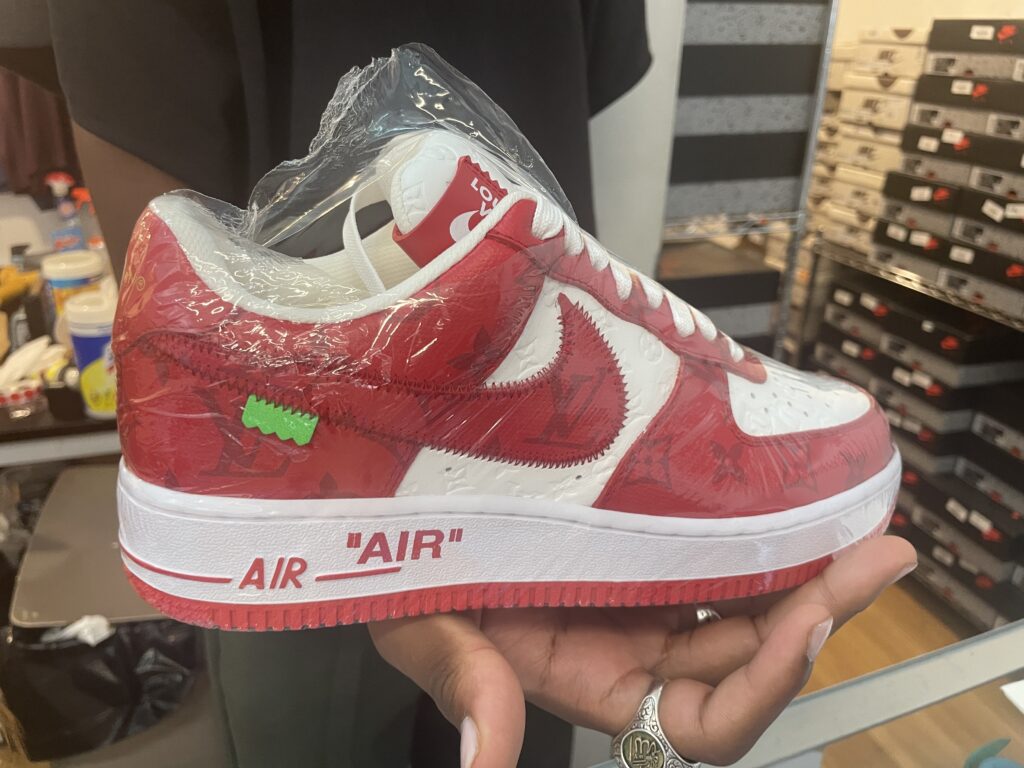
But… Why Here?
If there’s one thing all these places agree on, it’s that that they love the location. NoHo is the place to go for buying, selling, or trading kicks.

“It’s where all the Sneakerheads go,” says Yankeekicks’ Caroline. She also pointed out the exclusive club Zero Bond across the street, which draws all sorts of celebrities right to their doorstep. For HypeClub, there’s no foot traffic like on Broadway; “we don’t post much on Instagram, all our pull is right off the street.” With such a constant flow of tourists, international or from out of state, new faces are always popping in and out, looking for a memento from their trip to NYC.
Stephanie from A Sneaker City credits NoHo’s fashion presence and status as a retail hub. “There’s lots of fashion. You can feel the energy walking down the street. It makes you want to shop.” She’s not wrong: check out Hat Club, just down the street, for a great headwear accompaniment to your kicks!
For Zay, NoHo has long been the place to be. He would go to old-school pioneers like Dunkxchange when he was little, and remembers NoHo as a hub for skateboarding all the way back then. Today, it’s become a “big sneaker-con on Broadway.” Sometimes the details are harder to express. “You can’t go wrong, it’s NoHo!” said Panama. I couldn’t tell you why, but that feels like the best way to put it.
